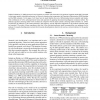Free Online Productivity Tools
i2Speak
i2Symbol
i2OCR
iTex2Img
iWeb2Print
iWeb2Shot
i2Type
iPdf2Split
iPdf2Merge
i2Bopomofo
i2Arabic
i2Style
i2Image
i2PDF
iLatex2Rtf
Sci2ools
102
click to vote
LREC
2010
2010
An Evaluation of Predicate Argument Clustering using Pseudo-Disambiguation
Schulte im Walde et al. (2008) presented a novel approach to semantic verb classication. The predicate argument model (PAC) presented in their paper models selectional preferences by using soft clustering that incorporates the Expectation Maximization (EM) algorithm and the MDL principle. In this paper, I will show how the model handles the task of differentiating between plausible and implausible combinations of verbs, subcategorization frames and arguments by applying the pseudo-disambiguation evaluation method. The predicate argument clustering model will be evaluated in comparison with the latent semantic clustering model by Rooth et al. (1999). In particular, the influences of the model parameters, data frequency, and the individual components of the predicate argument model are examined. The results of these experiments show that (i) the selectional preference model overgeneralizes over arguments for the purpose of a pseudo-disambiguation task and that (ii) pseudo-disambiguation...
Related Content
| Added | 29 Oct 2010 |
| Updated | 29 Oct 2010 |
| Type | Conference |
| Year | 2010 |
| Where | LREC |
| Authors | Christian Scheible |
Comments (0)

